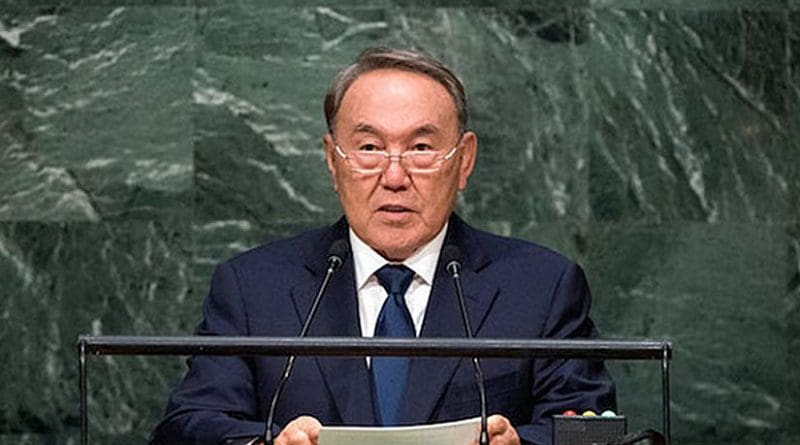Kazakh President Urges One Percent of Arms Budget for Development Agenda
By IDN
By Rodney Reynolds
The UN’s post-2015 development agenda, which includes 17 Sustainable Development Goals (SDGs), is desperately in need of funds for its successful implementation. The goals include an ambitious target: the elimination of hunger and poverty worldwide by 2030.
But that elusive goal can be reached only if the United Nations can help garner – both from the public and private sector – a staggering 3.5 to 5.0 trillion dollars per year.
Addressing the 193-member General Assembly in September, Secretary-General Ban Ki-moon asked: “Why is it easier to find money to destroy people and planet than it is to protect them?” He rightly pointed out that the world continues to squander trillions in wasteful military spending.
Last year (2014) the world’s total military expenditure amounted to a hefty 1.8 trillion dollars – roughly about 2.5 percent of world Gross Domestic Product (GDP).
When President Nursultan Nazarbayev of Kazakhstan addressed the General Assembly and the SDG summit in September, he focused specifically on a new political and economic order.
Speaking of SDGs, he urged every country to contribute 1.0 per cent of its military budget towards the funding of Sustainable Development Goals.
Perhaps the United Nations should take the lead – and follow up on it.
Among the other suggestions he made, the President called for the transformation of the UN’s Economic and Social Council (ECOSOC) into a Global Development Council.
Along with UN member states elected by the General Assembly, it could consist of the heads of all UN Specialized agencies, including the International Monetary Fund.
The Council should be tasked to become a global economic regulator involving projects carried out by this Council to promote economic growth worldwide.
This, he pointed out, will help decrease considerably the risks of global crises and ensure responsible behaviour by the states in maintaining their national economic and social policies.
Thirdly, he proposed a Global Strategic Initiative Plan whose core idea was to launch a new trend in global development based on fair conditions “where all nations would have equal access to world infrastructure, resources and markets as well as to maintain comprehensive accountability for human development.”
And equally important, he proposed the adoption of a Universal Declaration of the United Nations to achieve a world free of nuclear weapons.
“Kazakhstan was the first ever country to close a nuclear test site, renounced the world’s fourth largest nuclear arsenal and has contributed to the creation of a nuclear weapon free zone in Central Asia,” he said.
There is an acute need to establish nuclear-free zones in other regions of the world, particularly the Middle East. The nuclear powers must provide guarantees of the non-use of force for all countries that renounce possession of nuclear weapons, he insisted.
He also said the most pressing and serious global challenges – terrorism, demolition of the states, migration and other negative issues – are the result of the economic crisis, poverty, illiteracy and unemployment.
To tackle this global crisis, he said, “we need to start with clear rules for the emission and trade of the world reserve currencies as they do not now meet the criteria of justice, democracy, competitiveness, effectiveness and international control.”
Towards this end, he proposed the idea of a World Anti-crisis Plan, the draft of which was actively discussed on the margins of Astana Economic Forum last May.
He said he is also planning to convene in 2016 the United Nations International conference at the highest level, designed to reaffirm the basic principles of international law.
The threat of terrorism and religious extremism has become global in its scale.
“I propose establishing under the auspices of the UN a unified global network to counter international terrorism and extremism. To achieve this objective it is necessary to first develop and adopt a comprehensive document of the United Nations to combat terrorism.”
Additionally, in support of the UN initiative ‘Sustainable Energy for All’, an international EXPO on the theme Future Energy will be held in Astana in 2017.
“We invite all states to participate fully in the exhibition. Looking to the future and using the infrastructure put in place for EXPO 2017, I suggest opening in Astana an International Centre for the development of green technologies and investment projects under the auspices of the UN,” he said.

